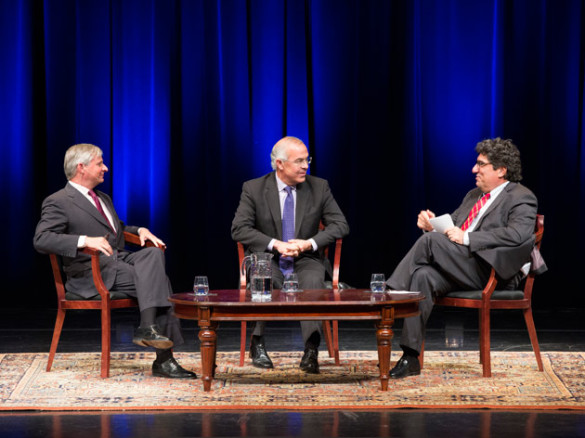
Unconventional and outspoken Republican presidential candidate Donald Trump is “the wrong answer to the right question,” said New York Times columnist David Brooks in his appearance at Vanderbilt’s Langford Auditorium Sept. 22. Chancellor Nicholas S. Zeppos hosted Brooks for a lively Chancellor’s Lecture Series discussion that also featured Distinguished Visiting Professor Jon Meacham.
Brooks recalled how he penned numerous columns over the past year declaring that Trump would never win the Republican nomination.
“The guy’s going to be taking the oath of office—he’ll be driving down Pennsylvania Avenue, and right up until then I’ll be writing, ‘Don’t worry, this is never going to happen,’” said Brooks, drawing laughter from the audience.
With Trump not only winning the nomination, but now in a virtual tie with Democratic rival Hillary Clinton, “I decided I should rediscover America and find out how I got it so massively wrong,” Brooks said.
What he’s determined by touring the country and talking to ordinary citizens over the past months is that the issues that gave rise to Trump go beyond differences in political ideology.
“The crisis of our moment is a crisis of social isolation,” he said, citing statistics that show people trust their neighbors less and have fewer close friends and confidants than ever before. They also experience loneliness and depression at greater rates.
Separately, Brooks said, they feel betrayed by institutions and have lost the sense of dignity they once achieved by doing humble but fulfilling work.
“That code of dignity, I believe, has been replaced in America with a reality TV code that says, ‘If you’re not making it big, and if you’re not famous, then you’re nothing,’” Brooks said. “[rquote]So you’ve got this massive social isolation, this massive sense of betrayal, and people want a change. They are completely realistic about who Trump is, but they’re willing to stomach it because they just feel threatened by the world order.”[/rquote]
Brooks said that socially speaking, college-educated and noncollege-educated Americans have been “in different universes” for a long time. But now our politics is catching up with that social division, with more college-educated people identifying as Democrats and more noncollege-educated people identifying as Republicans. “And the combination of politics and class war is a truly ugly prospect,” he said.
“For about a hundred years of history, it was big government versus little government, left versus right. In my view, that’s over,” he said. “The key debate now is between those who feel the tailwinds of globalization and meritocracy at their back, pushing them forward toward opportunity, and those who feel the headwinds in their face, destroying their communities.”
How can we combat this deeply felt sense of division and social isolation? For one thing, Brooks said, we each have a responsibility to be part of an organization, volunteer or other, that transcends social class and puts us in contact with people completely unlike ourselves.
“Embracing people across class lines in that intimate way—it’s mushy to say—but it really is the only way out,” he said.
“You have so many fans in the audience, myself included,” Zeppos told Brooks. “We’ve all followed your career, and you’re very much on an intellectual odyssey yourself, injecting history, economics, sociology, even neuroscience into your writing. What accounts for the shift?”
“Frankly, this is just a middle-aged calling,” Brooks said. “My view is that our culture is over-politicized and under-moralized, and we need more people talking about moral subjects—how to use suffering for virtue, to promote some goodness; how to feel transcendence; what grace feels like.
“I just feel we don’t talk about that stuff enough,” he said. “So I feel called to do my little part to shift the debate in the right direction.”